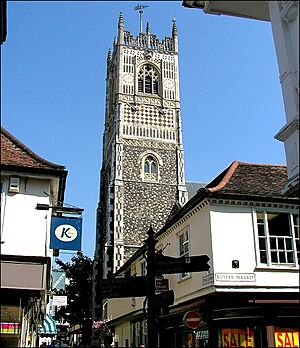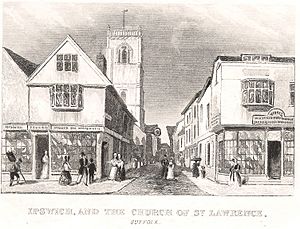St Lawrence Church, Ipswich facts for kids
St Lawrence Church is a very old and special building in Ipswich, Suffolk. It used to be a church, but now it's a busy place for the community. This amazing building was built in the 1400s. It is famous for having the oldest set of five church bells anywhere in the world!
Contents
A Look Back: The Church's Story
St Lawrence Church was built a long time ago on Dial Lane in the middle of Ipswich. In 1882, the top part of its tower was rebuilt. This work was done by a company from London called Barnes and Gaye.
Victorian Style and Changes
The new design for the tower was in the Victorian style. It has pretty patterns made of flint, like flowers and shapes. You can also see the letters "S" and "L" on the tower. Something unusual happened during this rebuild: the middle path inside the church was removed. This was done to stop certain types of church services from being held there.
From Church to Community Hub
St Lawrence was used as a local church until the early 1970s. At that time, the church leaders decided it was no longer needed because it had no members. The Ipswich Historic Churches Trust (IHCT) took over the building. For a while, the church became quite run down.
After a lot of planning and big repair jobs, the church opened again in July 2008. It became a place where people could eat and see art. The repairs cost about £1.2 million. This money came from the Ipswich Borough Council and grants from the UK government.
The Famous Bells
The tower of St Lawrence Church holds the oldest set of church bells in the world. There are five bells in total. They are hung in a new steel frame that allows them to be rung in a special way called "change ringing."
Wolsey's Bells
These bells are often called "Wolsey's bells." This is because Cardinal Wolsey grew up nearby. He was a very important person in English history. People believe that Wolsey's uncle, Edmund Daundy, might have paid for one of the bells. Four of the bells were made around the year 1450. The fifth bell was added about 30 years later, around 1480.
Saving the Bells
The bells are still in great condition. They have not been changed or damaged, and they even have their original clappers! In 1985, the bells had to be taken down because the tower was not safe. After the tower was fixed and a new frame was put in, the bells were checked by the Whitechapel Bell Foundry. They were then put back into use in September 2009.
According to the Ipswich Historic Churches Trust, the next oldest set of five bells is in St Bartholomew the Great church. Those bells were made in the year 1500. The Church Building Council, part of the Church of England, agrees that these bells are very important to history.



